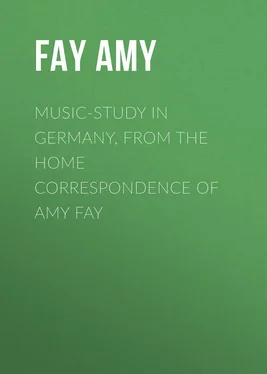Amy Fay - Music-Study in Germany, from the Home Correspondence of Amy Fay
Здесь есть возможность читать онлайн «Amy Fay - Music-Study in Germany, from the Home Correspondence of Amy Fay» — ознакомительный отрывок электронной книги совершенно бесплатно, а после прочтения отрывка купить полную версию. В некоторых случаях можно слушать аудио, скачать через торрент в формате fb2 и присутствует краткое содержание. Жанр: foreign_antique, foreign_prose, на английском языке. Описание произведения, (предисловие) а так же отзывы посетителей доступны на портале библиотеки ЛибКат.
- Название:Music-Study in Germany, from the Home Correspondence of Amy Fay
- Автор:
- Жанр:
- Год:неизвестен
- ISBN:нет данных
- Рейтинг книги:4 / 5. Голосов: 1
-
Избранное:Добавить в избранное
- Отзывы:
-
Ваша оценка:
- 80
- 1
- 2
- 3
- 4
- 5
Music-Study in Germany, from the Home Correspondence of Amy Fay: краткое содержание, описание и аннотация
Предлагаем к чтению аннотацию, описание, краткое содержание или предисловие (зависит от того, что написал сам автор книги «Music-Study in Germany, from the Home Correspondence of Amy Fay»). Если вы не нашли необходимую информацию о книге — напишите в комментариях, мы постараемся отыскать её.
Music-Study in Germany, from the Home Correspondence of Amy Fay — читать онлайн ознакомительный отрывок
Ниже представлен текст книги, разбитый по страницам. Система сохранения места последней прочитанной страницы, позволяет с удобством читать онлайн бесплатно книгу «Music-Study in Germany, from the Home Correspondence of Amy Fay», без необходимости каждый раз заново искать на чём Вы остановились. Поставьте закладку, и сможете в любой момент перейти на страницу, на которой закончили чтение.
Интервал:
Закладка:
After an instant's consideration I concluded the latter course was the safer, and so I said, boldly, " Nein ." " Kommen Sie hierher! (Come here!)" said he, and to my horror I had to step up to the blackboard in front of this large class. He harangued me for some minutes, and then writing some notes on the bass clef, he put the chalk into my hands and told me to write. Not one word had I understood, and after staring blankly at the board I said, " Ich verstehe nicht (I don't understand.)" " Nein? " said he, and carefully went over all his explanation again. This time I managed to extract that he wished me to write the succession of chords that those bass notes indicated, and to tie what notes I could. A second time he put the chalk into my hands, and told me to write the chords. "Heaven only knows what they are!" thinks I to myself. In my desperation, however, I guessed at the first one, and uttered the names of the notes in trembling accents, expecting to have a cannon fired off at my head. Thanks to my lucky star, it happened to be right. I wrote it on the blackboard, and then as my wits sharpened I found the other chords from that one, and wrote them all down right. I drew a long breath of relief as he released me from his clutches, and sat down hardly believing I had done it. I have not now the least idea what it was he made me do, but I suppose it will come to me in the course of the year! As he does not understand a word of English, I cannot say anything to him unless I can say it in German, and as he is determined to make me learn Harmony, it would be of no use to explain that I did not know what he was talking about, for he would begin all over again, and go on ad infinitum . I have got a book on the Theory of Music, which I am reading with Fräulein W. She has studied with Weitzmann, also, and when I have caught up with the class I shall go on very easily. I quite adore Weitzmann. He has the kindest old face imaginable, and he hammers away so indefatigably at his pupils! The professors I have described are all thorough and well-known musicians of Berlin, and I wonder that people could tell us before I came away, and really seem to believe it, "that I could learn as well in an American conservatory as in a German one." In comparison with the drill I am now receiving, my Boston teaching was mere play.
CHAPTER II
I heard Clara Schumann on Sunday, and on Tuesday evening, also. She is a most wonderful artist. In the first concert she played a quartette by Schumann, and you can imagine how lovely it was under the treatment of Clara Schumann for the piano, Joachim for the first violin, De Ahna for the second, and Müller for the 'cello. It was perfect, and I was in raptures. Madame Schumann's selection for the two concerts was a very wide one, and gave a full exhibition of her powers in every kind of music. The Impromptu by Schumann, Op. 90, was exquisite. It was full of passion and very difficult. The second of the Songs without Words, by Mendelssohn, was the most fairy-like performance. It is one of those things that must be tossed off with the greatest grace and smoothness, and it requires the most beautiful and delicate technique. She played it to perfection. The terrific Scherzo by Chopin she did splendidly, but she kept the great octave passages in the bass a little too subordinate, I thought, and did not give it quite boldly enough for my taste, though it was extremely artistic. Clara Schumann's playing is very objective. She seems to throw herself into the music, instead of letting the music take possession of her. She gives you the most exquisite pleasure with every note she touches, and has a wonderful conception and variety in playing, but she seldom whirls you off your feet.
At the second concert she was even better than at the first, if that is possible. She seemed full of fire, and when she played Bach, she ought to have been crowned with diamonds! Such noble playing I never heard. In fact you are all the time impressed with the nobility and breadth of her style, and the comprehensiveness of her treatment, and oh, if you could hear her scales ! In short, there is nothing more to be desired in her playing, and she has every quality of a great artist. Many people say that Tausig is far better, but I cannot believe it. He may have more technique and more power, but nothing else I am sure. Everybody raves over his playing, and I am getting quite impatient for his return, which is expected next week. I send you Madame Schumann's photograph, which is exactly like her. She is a large, very German-looking woman, with dark hair and superb neck and arms. At the last concert she was dressed in black velvet, low body and short sleeves, and when she struck powerful chords, those large white arms came down with a certain splendor.
As for Joachim, he is perfectly magnificent, and has amazing power . When he played his solo in that second Chaconne of Bach's, you could scarcely believe it was only one violin. He has, like Madame Schumann, the greatest variety of tone, only on the violin the shades can be made far more delicate than on the piano.
I thought the second movement of Schumann's Quartette perhaps as extraordinary as any part of Clara Schumann's performance. It was very rapid, very staccato , and pianissimo all the way through. Not a note escaped her fingers, and she played with so much magnetism that one could scarcely breathe until it was finished. You know nothing can be more difficult than to play staccato so very softly where there is great execution also. Both of the sonatas for violin and piano which were played by Madame Schumann and Joachim, and especially the one in A minor, by Beethoven, were divine. Both parts were equally well sustained, and they played with so much fire – as if one inspired the other. It was worth a trip across the Atlantic just to hear those two performances.
The Sing-Akademie, where all the best concerts are given, is not a very large hall, but it is beautifully proportioned, and the acoustic is perfect. The frescoes are very delicate, and on the left are boxes all along, which add much to the beauty of the hall, with their scarlet and gold flutings. Clara Schumann is a great favorite here, and there was such a rush for seats that, though we went early for our tickets, all the good parquet seats were gone, and we had to get places on the estrade , or place where the chorus sits – when there is one. But I found it delightful for a piano concert, for you can be as close to the performer as you like, and at the same time see the faces of the audience. I saw ever so many people that I knew, and we kept bowing away at each other.
Just think how convenient it is here with regard to public amusements, for ladies can go anywhere alone! You take a droschkie and they drive you anywhere for five groschen, which is about fifteen cents. When you get into the concert hall you go into the garde-robe and take off your things, and hand them over to the care of the woman who stands there, and then you walk in and sit down comfortably as you would in a parlour, and are not roasted in your hat and cloak while at the concert, and chilled when you go out, as we are in America. Their programmes, too, are not so unconscionably long as ours, and, in short, their whole method of concert-giving is more rational than with us. I always enjoy the garde-robe, for if you have acquaintances you are sure to meet them, and you have no idea how exciting it is in a foreign city to see anybody you know.
I suppose you are muttering maledictions on my head for not writing, but I am so busy that I have no time to answer my letters, which are accumulating upon my hands at a terrible rate. This week I have been out every night but one, so that I have had to do all my practicing and German and Harmony lessons in the day-time; and these, with my daily hour and a half at the conservatory, have been as much as I could manage.
Читать дальшеИнтервал:
Закладка:
Похожие книги на «Music-Study in Germany, from the Home Correspondence of Amy Fay»
Представляем Вашему вниманию похожие книги на «Music-Study in Germany, from the Home Correspondence of Amy Fay» списком для выбора. Мы отобрали схожую по названию и смыслу литературу в надежде предоставить читателям больше вариантов отыскать новые, интересные, ещё непрочитанные произведения.
Обсуждение, отзывы о книге «Music-Study in Germany, from the Home Correspondence of Amy Fay» и просто собственные мнения читателей. Оставьте ваши комментарии, напишите, что Вы думаете о произведении, его смысле или главных героях. Укажите что конкретно понравилось, а что нет, и почему Вы так считаете.












